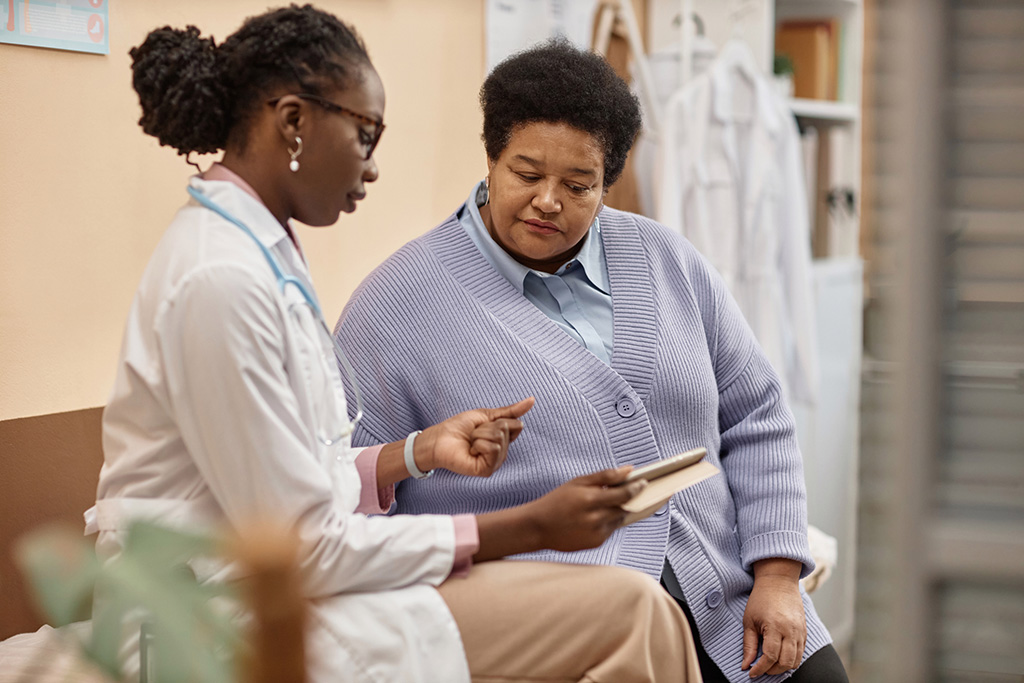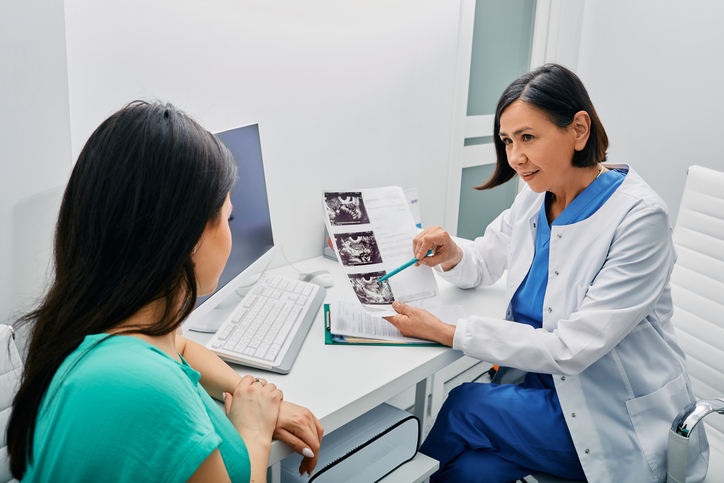AllCare is pleased to announce the opening of its newest location in Braselton, expanding access to high-quality, patient-centered healthcare for...
PCOS Treatment in Georgia
From reproductive years through menopause, there are many conditions that affect women’s hormones. One of them is Polycystic Ovary Syndrome, also known as PCOS. At AllCare Primary & Immediate Care, we understand how disheartening the symptoms of PCOS can be—especially if you are trying to conceive. From medications to hormonal treatments, our dedicated health professionals are well-versed in PCOS, and they help guide you through your testing and PCOS support with compassion, prioritizing your well-being every step of the journey.

What Is PCOS?
Polycystic Ovary Syndrome (PCOS) is a common hormonal disorder affecting people with ovaries, typically during their reproductive years. PCOS occurs when the ovaries produce higher-than-normal levels of androgens (male hormones), which can disrupt the development and release of eggs during ovulation. This condition often leads to irregular menstrual cycles, difficulty conceiving, and a variety of physical symptoms, such as excess hair growth, acne, and weight gain. Additionally, small fluid-filled sacs (cysts) may form in the ovaries.
PCOS Diagnosis & Treatments Offered in Georgia

What Causes PCOS?
The exact cause of PCOS is not fully understood, but several factors are believed to contribute to its development:
- Many people with PCOS have insulin resistance, meaning their bodies have trouble using insulin effectively.
- Excess levels of androgens (male hormones) can interfere with the development of eggs in the ovaries and prevent ovulation. This hormonal imbalance is a key feature of PCOS.
- PCOS tends to run in families, suggesting that genetic factors may play a role. If a close relative, such as a mother or sister, has PCOS, there’s a higher chance of developing the condition.
- Being overweight.
- Low-grade inflammation is often present in individuals with PCOS.
Together, these factors create a cycle of hormonal imbalances that can affect ovulation, metabolism, and overall health.
Who Can Benefit from PCOS Treatment Services?
We offer comprehensive testing, accurate diagnoses, and a number of treatment options for anyone who is experiencing the PCOS. Here are some examples of individuals who can benefit from our PCOS treatment services:
- Anyone assigned female at birth of reproductive age who may be experiencing symptoms of PCOS.
- People with irregular periods
- Those with excessive facial and body hair growth
- Anyone with additional PSOC of PCOS who is also experiencing weight gain or having difficulty losing weight
- People with male-pattern baldness or thinning hair
- Those who have dark patches of skin on their neck, armpits, or under their breasts
- Anyone with a family history of PCOS
- People who have type 2 diabetes and are experiencing at least one other PCOS symptom
- Those who have experienced rapid weight gain


Online Doctor Visits and Telehealth Services
Experience the convenience of telehealth appointments at AllCare Primary & Immediate Care. Our telemedicine services are designed to provide you with seamless access to healthcare without the need to leave your home. Whether you need an online doctor’s appointment for immediate or primary care, AllCare’s got you covered. With our online telehealth services currently available to individuals located in Georgia, you can connect with our experienced urgent and primary care physicians via secure video calls.
At AllCare Primary & Immediate Care, we are expanding our virtual healthcare access to all services previously offered in person. This includes:
How Do I Get an Appointment for PCOS Treatment
Women who have PCOS often experience a range of emotions—from anxiety and depression to feeling relieved when properly diagnosed. Be sure to discuss your symptoms with an AllCare physician to make sure that none of them are putting you at risk for other conditions, including type 2 diabetes, high blood pressure, heart disease, or sleep apnea, to name a few. AllCare Primary & Immediate Care offers convenient appointments that fit your schedule with experts who understand the unique needs of women.

Frequently Asked Questions
Is PCOS an autoimmune disease?
No, Polycystic Ovary Syndrome (PCOS) is not classified as an autoimmune disease. PCOS is primarily a hormonal disorder that affects the ovaries and reproductive system. While it shares some symptoms with autoimmune conditions, such as chronic inflammation and insulin resistance, it does not involve the immune system attacking the body’s own tissues, which is the hallmark of autoimmune diseases. However, research suggests that people with PCOS may have an increased risk of developing certain autoimmune conditions, such as Hashimoto’s thyroiditis, but PCOS itself is not considered autoimmune in nature.
How is PCOS diagnosed?
There is no single test that can diagnose PCOS. In fact, a diagnosis is often made by your medical history, including:
- Irregular menstrual cycles since puberty (while not on hormones, like birth control)
- Excessive hair growth or elevated testosterone blood levels
- Acne
- Sacs on your ovaries (found on an ultrasound)
Can PCOS Cause Weight Gain?
Yes, Polycystic Ovary Syndrome (PCOS) can lead to weight gain due to hormonal imbalances, particularly elevated insulin levels, which can increase appetite and promote fat storage, especially around the abdomen.
Individuals with PCOS may also experience changes in metabolism and fatigue, making it harder to maintain a healthy weight. Managing weight is crucial, as even a small weight loss can improve symptoms, regulate menstrual cycles, and enhance fertility.
Can PCOS be cured?
No. Currently, there is no cure for PCOS. While PCOS cannot be completely cured, many individuals can alleviate symptoms and improve their quality of life with consistent management. Medications may help regulate menstrual cycles, reduce excessive hair growth, and address insulin resistance.
Incorporating healthy dietary choices, regular physical activity, and stress management can also significantly impact symptom control and overall well-being. Regular check-ups with healthcare providers are essential for monitoring the condition and adjusting treatment plans as needed. With proper management, individuals with PCOS can lead healthy lives and minimize long-term health risks.
How can you get pregnant with PCOS?
Getting pregnant with PCOS can be challenging, but many people with PCOS successfully conceive with the right approach. Here are some common strategies to help manage fertility and improve the chances of pregnancy:
- Lifestyle Changes: Weight loss through diet and exercise can help regulate ovulation and boost fertility.
- Ovulation Tracking: Monitoring ovulation using predictor kits or ultrasounds can help time intercourse or treatments effectively.
- Fertility Treatments: Various assisted reproductive technologies can be considered if other methods don’t work.
If you’re struggling with PCOS, schedule an appointment at AllCare Primary & Immediate Care to explore effective PCOS treatment for pregnancy tailored to your needs.
schedule your PSOC treatment appointment
The Latest Healthcare News
Check out our blog to learn more from our team about the latest medical advancements, health tips, and primary care news.
Lauren Schwartz, F.N.P.-C. of AllCare Appeared on “The Weekly Check-Up” Radio Show
Lauren Schwartz, F.N.P.-C. of AllCare Primary & Immediate Care appeared as a featured guest on “The Weekly Check-Up” on December 21, 2025. The...
AllCare’s Dr. Racheal Daniels Discusses Holiday Health and Primary Care on WSB-TV’s “Daily 2”
Dr. Racheal Daniels of AllCare Primary & Immediate Care recently appeared on WSB-TV’s Daily 2 to discuss the importance of prioritizing primary...
Related Services
Our related healthcare services extend beyond immediate care to include preventive care such as routine physical exams, chronic disease management for conditions like diabetes, and specialty care referrals for more complex health issues.










